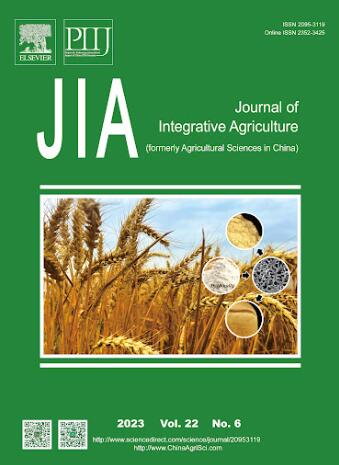脂肪激素信号调节迁徙蝗虫成年后的抗脱水能力
IF 4.4
1区 农林科学
Q1 AGRICULTURE, MULTIDISCIPLINARY
引用次数: 0
摘要
在气候变化的影响下,干旱事件变得更加严重,这可能对各种生物的生存构成重大威胁。抗脱水的分子机制尚不十分清楚。在这里,研究人员对迁徙蝗虫的成虫进行了食物介导的脱水实验,发现脂肪动情激素(AKH)信号传导在调节抗脱水能力中起着关键作用。具体来说,脱水缩短了成年蝗虫的寿命,增加了体重损失,降低了失水率。全局转录组图谱显示,抗脱水蝗虫与正常蝗虫的组织特异性基因表达存在差异。重要的是,脱水选择和暴露诱导了成年蝗虫后脑复合体中基因的显著表达。此外,单独敲除AKH1、AKH2或AKH受体(AKHR)会加速成虫在脱水条件下的失水并缩短其寿命,而补充三卤糖会改善干扰AKH或AKHR所造成的负面影响。 这些研究结果表明,依赖于AKH/AKHR信号的三卤糖代谢在调节蝗虫的抗脱水能力中起着至关重要的作用,从而为抗旱性的调控机制提供了新的见解。本文章由计算机程序翻译,如有差异,请以英文原文为准。
Adipokinetic hormone signaling regulates adult dehydration resistance in the migratory locust
Drought events have become more severe under climate change, and this can pose a major threat to the survival of various organisms. The molecular mechanisms involved in dehydration resistance are not well known. Here, adults of the migratory locust, were subjected to food-mediated dehydration, and adipokinetic hormone (AKH) signaling was found to play a key role in regulating dehydration resistance. Specifically, dehydration shortened the lifespan, increased the body weight loss, and reduced the water loss rate in adult locusts. Global transcriptome profiles revealed variations in tissue-specific gene expression between dehydration-resistant locusts and normal locusts. Importantly, dehydration selection and exposure induced prominent expression of genes in the retrocerebral complex of adult locusts. Furthermore, individual knockdown of AKH1, AKH2, or AKH receptor (AKHR) accelerated water loss and shortened the lifespan of adult locusts under dehydration conditions, and trehalose supplementation ameliorated the negative effects caused by interference with AKH or AKHR. These findings demonstrated that AKH/AKHR signaling-dependent trehalose metabolism plays a crucial role in regulating locust dehydration resistance and thus provide novel insights into the regulatory mechanism underlying drought resistance.
求助全文
通过发布文献求助,成功后即可免费获取论文全文。
去求助
来源期刊

Journal of Integrative Agriculture
AGRICULTURE, MULTIDISCIPLINARY-
CiteScore
7.90
自引率
4.20%
发文量
4817
审稿时长
3-6 weeks
期刊介绍:
Journal of Integrative Agriculture publishes manuscripts in the categories of Commentary, Review, Research Article, Letter and Short Communication, focusing on the core subjects: Crop Genetics & Breeding, Germplasm Resources, Physiology, Biochemistry, Cultivation, Tillage, Plant Protection, Animal Science, Veterinary Science, Soil and Fertilization, Irrigation, Plant Nutrition, Agro-Environment & Ecology, Bio-material and Bio-energy, Food Science, Agricultural Economics and Management, Agricultural Information Science.
 求助内容:
求助内容: 应助结果提醒方式:
应助结果提醒方式:


